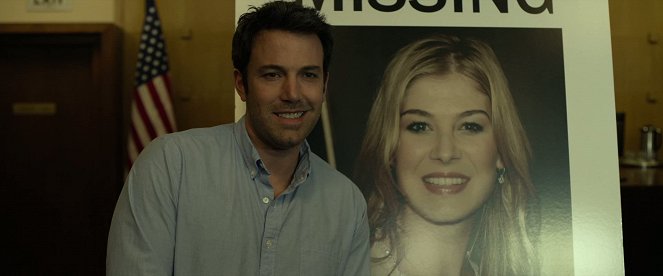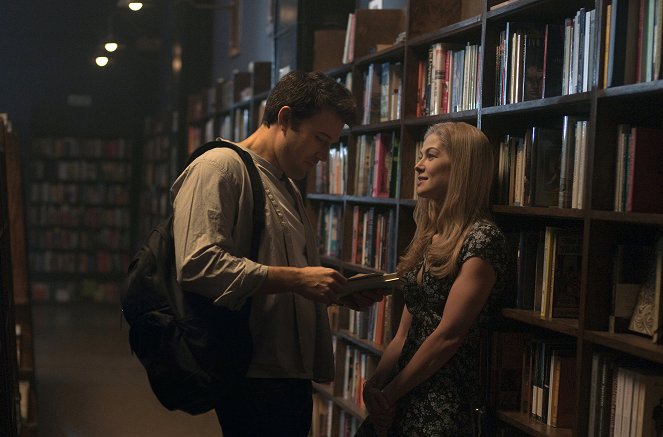Directed by:
David FincherScreenplay:
Gillian FlynnCinematography:
Jeff CronenwethCast:
Ben Affleck, Rosamund Pike, Neil Patrick Harris, Tyler Perry, Carrie Coon, Kim Dickens, Patrick Fugit, David Clennon, Lisa Banes, Missi Pyle, Emily Ratajkowski (more)VOD (5)
Plots(1)
GONE GIRL unearths the secrets at the heart of a modern marriage. On the occasion of his fifth wedding anniversary, Nick Dunne (Ben Affleck) reports that his beautiful wife, Amy (Rosamund Pike), has gone missing. Under pressure from the police and a growing media frenzy, Nick's portrait of a blissful union begins to crumble. Soon his lies, deceits and strange behavior have everyone asking the same dark question: Did Nick Dunne kill his wife? (20th Century Fox)
(more)Videos (2)
Reviews (18)
Gone Girl is a compact mosaic of events chiseled to perfection. Surgically confident and precisely timed in every scene and every shot. That is why, and for my admiration of David Fincher’s talent, I regret that it is also very cold and impersonal. That it does not allow the audience to engage, only to observe from a distance. That’s all part of the maestro’s game, but it’s a shame. Electronic music composers Trent Reznor and Atticus Ross once gave the musical identity to the world of heroes who created an internet phenomenon out of ones and zeros. Original and effective. But what is this detached, chemical-like music doing in the story of a relationship between two people? Wouldn’t Gone Girl be an even better movie had it been driven by passion and emotion? It is a film about the disintegration of a marriage that looks and sounds the same as Steven Soderbergh’s thriller about a lethal global virus.
()
Gone Girl is a really good atmospheric drama, the kind probably only David Fincher can make. But that’s my problem – whenever I see Fincher and a thriller, I expect something in the vein of Seven. But as opposed to this flick, everything about Seven was perfect. In this case, the movie is close to perfect, which is also why I was originally going to give it a five-star review. But as time went on, I decided to take one star off because there were things in the movie that messed up the perfection. Take for instance Neil Patrick Harris. His character was good, but I’d never cast him into a serious thriller like this. He simply doesn’t belong into movies like that, no matter how hard he tries. You may have noticed that nobody even mentions him here. By contrast, Rosamund Pike puts in a performance that will be really hard to ever to surpass for her. I hadn’t seen such a good performance in a long time and I will not forget it any time soon, if ever. Despite her perfect performance, you still have Ben Affleck, about whom I really don’t know what to think. I definitely wouldn’t say he’s stiff, which is what a lot of people here are saying, I simply didn’t know where to put him. It seemed to me he had no opinions of his own and I still feel the same way. Well, and these three actors portray probably the three most important characters in the movie. And that’s where it all starts from and also what it lives and dies with. As regards the story, it’s absolutely clear to me why Fincher had picked it. The same way it was clear to me why he’d picked the ‘Millennium Trilogy’. It’s obvious that he likes stories like these. He simply loves the unexpected twists. Let me just add that this movie didn’t get five stars because the ending was cut off unnecessarily fast. I would have expected some kind of conclusion that would knock me off my feet and that I could keep thinking about without having to get back to the movie as a whole. Simply some knock-out ending. Something similar to what you get in Shutter Island. Unfortunately, that didn’t happen, hence the four-star review. At the same time, I think that it is one of the best movies Fincher has ever made. If he just went on making movies like this, I wouldn’t mind at all.
()
I haven't seen a movie this suspenseful in a long, a truly long time. It's so terribly suspenseful that after the first line I was ready to rewind the film to the end to see how it would turn out. It blends so many things that I love in movies. Unexpected twists and turns, engaging narration from the main heroine, and... one big game. And the best part is the insightful, even clinical way in which it's filmed. I have no complaints about the cast either. I'm simply and plainly blown away and if anyone asks me for a movie recommendation this year, this one will immediately jump out at me. Anyway, I'm off to buy the book this weekend. 5 stars.
()
Spoilers ahead. A five-act play about marriage and engaging storytelling. The film not only preserves the book’s “he said/she said” structure, but further thematises the telling of various versions of the same story through words and images. From the storytelling perspective, Gone Girl is notable in both how the film communicates with the viewer and how the individual narrative segments communicate with each other. One gets the impression that the information in Amy’s diary is a response to what Nick is experiencing and vice versa. The diary flashbacks trigger events in the present (the discovery of Amazing Amy’s artifacts) and the returns to the present are handled with fluid graphic transitions (the kiss – wiping of the mouth), thanks to which the shots organically complement each other. As the co-creator of Nick’s story, Amy is thus seemingly present even in scenes in which she does not physically appear (in the book, this impression is achieved through Nick’s feeling that Amy is looking over his shoulder and commenting on the text of the novel that he is writing). Thanks to the “cooperation” between the information from the past and that from the present, both storylines can serve to convey evidence supporting the intensification of the police investigation (which Flynn does not needlessly delay here, making better use of it than in the book to tighten up the narrative). Similar communication takes place at a higher level between the first and second parts of the film. In the second part, there are variations on scenes from the first part, with a different allocation of the roles of prey and predator (first Nick and then Amy suspects that someone is moving around in front of the house) and different motivations for their actions (the goal of “finding Amy” remains, but until the final act, it is not her life that is in danger, but Nick’s). ___ Like the composition of some of the shots, which are terrifying in how inhumanly perfectly centred they are, the similarity of whole scenes is confirmation of Fincher’s obsession with symmetry. Even so, I don’t consider the moral relativism of either the book or the film to be as well-honed as their creators would have liked. Against a sadomasochistic sociopath and murderer stands a rather ordinary guy who “only” lies, treats his own father like shit and has been unfaithful to his wife. ___ I suspect that the negative depiction of the female protagonist was the reason that the book appealed to Fincher. Nevertheless, women who have been betrayed may feel a certain satisfaction from the fact that Amy exclusively uses feminine weapons to symbolically castrate her husband (for which we are prepared by Go’s “Protect Your Nuts” T-shirt in the opening scene). Her power does not consist in thinking and acting like a man. ___ Fincher’s handling of the audio-visual form of every shot is more masterful from film to film. Minor adjustments in colour, pacing and shot size are used to adapt the overall noirish atmosphere with cold colours into a clinical police procedural here, a toxically cynical relationship satire there (along the lines of Who's Afraid of Virginia Woolf?) and even a splatter flick. Instead of switching between thriller, biting social commentary and dark comedy, these individual types are layered on top of each other, so that we can view each scene from multiple (genre) perspectives and admire the precision with which Fincher takes care to ensure that none of the genres dominates and that the viewer cannot experience the satisfaction that comes with the fulfilment of a particular formula. The ending is as unsatisfying (in the sense of not being a typical Hollywood ending) as what the film says about certainty in marriage and honesty in relationships generally. 85%
()
(less)
(more)
Like Paul Thomas Anderson, David Fincher is moving toward an increasingly subdued and austere form of perfection in his directing. After the first part of their respective filmographies, which was characterised by ostentatious formal bombast culminating, in Fincher’s case, in Panic Room with abundant playing with flying camerawork in flawless reality-defying approaches, greater efficiency and modesty are increasingly becoming hallmarks of their later films. That doesn’t mean that Fincher and Anderson have become some sort of ascetics, but only that their mastery is reflected in the fact that they do not in any way attract attention to themselves. We could almost mention the return of studio style, where the form also served to maximally draw viewers into the story and did not have to draw attention to itself, except this time it’s not a matter of following certain conventional rules, but expressing flawless familiarisation with the craft and maximally well-though-out composition of every shot so that it serves the work as a whole. Gone Girl is Fincher’s riveting masterclass on outwitting viewers, where at the same time we are astonished not only by the narrative (typically about characters who deceive those around them and inventively work with their own image), but also by how seemingly easily and subtly the film guides us and keeps us chained to the screen and holding our breath throughout its runtime.
()



Ads